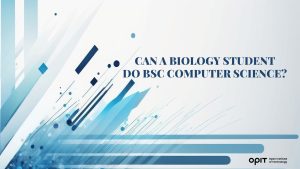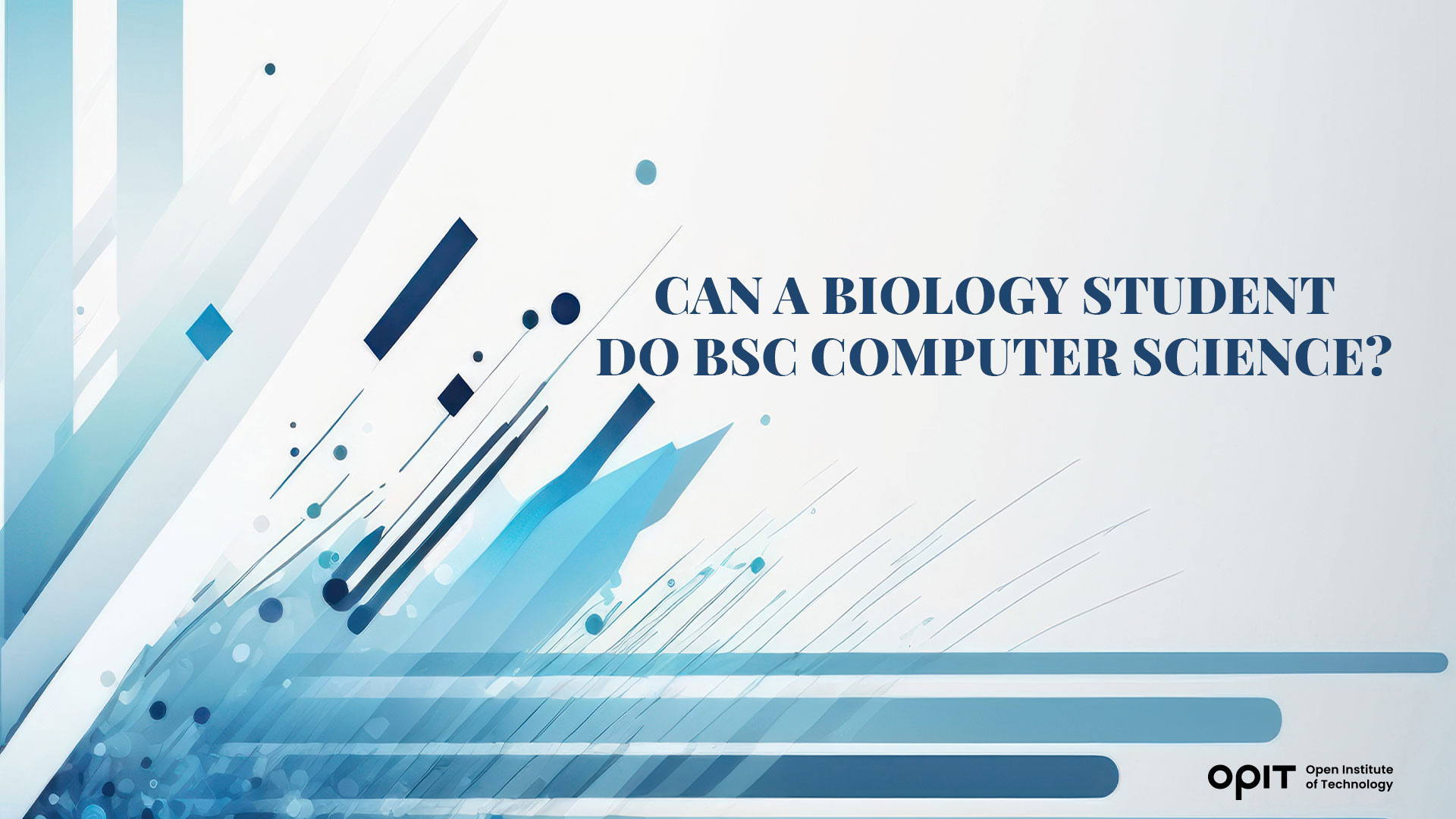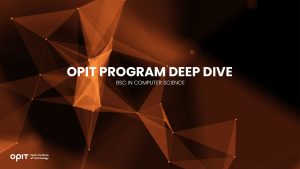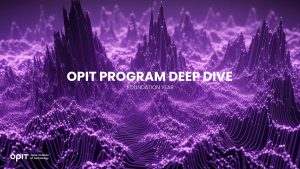

Most of the modern world – work, private life, and entertainment – revolves around computers and IT in general. Naturally, this landscape creates a high demand for computer science jobs. As a result, BSc Computer Science positions are well-paid and offer excellent career opportunities.
With all these advantages considered, it’s no wonder that people from other professions pivot toward computer science. This includes biology students, too.
But can a biology student do BSc Computer Science? And, equally as important, should they?
The answer to the first question is relatively complex and will represent the bulk of this article. But the second answer is a resounding yes. Interdisciplinary education can be a massive advantage in today’s world, providing venues for innovation and greater career advances.
Let’s delve deeper into the question of can a biology student do BSc Computer Science.
Background on BSc Computer Science
A BSc degree is often a part of professional development for people interested in IT. The degree usually follows a core computer science course. After obtaining the BSc, you can move forward towards a specialization or pursue a PhD in the field.
As a biology student, your path to BSc Computer Science will be different. The first step on the way is to understand what computer science is, which areas it covers, and what core skills it requires. This section will explain just that, plus the career opportunities that come with BSc Computer Science.
Definition and Scope
Computer science deals with computer systems. If you’re (rightfully) wondering what that means precisely, the answer is: practically anything related to computers.
A computer scientist can work on the architecture and structure of a processor chip. On the other hand, their colleague could be engaged in supporting the structure of the internet. Both roles fall under the umbrella of computer science.
At its core, this branch of IT concerns with questions about the nature of computing. In that light, one of the computer scientist’s main tasks is to understand what a computer system is. Then, these professionals can move onto designing different systems for particular purposes.
Core Subjects and Skills
BSc Computer Science courses teach core subjects that provide the essential skills for the job. As you might presume, programming is the crucial skill of a computer scientist. This skill requires proficiency in programming languages and a deep understanding of data structures. In addition, knowing the ins and outs of algorithms is pivotal for programming.
Software development is another skill that computer scientists must have. Besides coding knowledge, this skill calls for high proficiency in the principles of software engineering. A good computer scientists should be able to perform the entire development process from coding to implementation.
Computer science calls for a good understanding of math basics like algebra and calculus. However, advanced techniques will also be necessary.
Finally, a computer scientist should have a firm grasp on data analysis and visualization. The former improves professional capabilities, while the latter helps communicate the data to the stakeholders.
Core subjects in BSc Computer Science courses that tackle these and other skills include:
- Programming principles
- Computer networks
- Computer architectures
- Foundational mathematics
- Data structures and Algorithms
- Web development
- Introduction to operating systems
- Cloud computing
- Programming paradigms
Job Prospects and Career Opportunities
Employment in the computer science sector is growing rapidly, following a trend that’s projected to continue throughout the decade. The U.S. Bureau of Labor Statistics expects a 15% growth in the computer science landscape, along with hundreds of thousands of new jobs.
As the IT sector keeps innovating, even more jobs may become available. After all, many of today’s most desired professions didn’t exist at the start of the century, and computer science is developing rapidly.
Some of the career opportunities in computer science are for programmers, systems analysts, support specialists, software and computer engineers, and data scientists.
Comparing Biology and Computer Science
The question of can a biology student do BSc Computer Science comes down to a few crucial considerations. One of the first things you might ask is: what do computer science and biology even have in common.
Surprisingly, there are considerable similarities between the two fields.
Similarities
The most obvious aspect that computer science and biology share is that both are scientific disciplines. This means that the scientific approach is a hard requirement for both fields.
Biology and computer science aim to solve problems following two crucial methods: data analysis and interpretation and the scientific principle. A computer scientist will follow the same path to a conclusion as a biologist:
- Observation
- Question
- Hypothesis
- Prediction
- Testing
- Iteration
Furthermore, both disciplines will utilize mathematical models, although computer science will lean into math more than biology. Lastly, living organisms can be thought about as systems, which is somewhat similar to a computer scientist’s understanding of computers and other IT technologies.
Differences
Of course, the differences between biology and computer science will be much more evident. The two fields employ completely different sets of skills and require knowledge specific to their subjects. Naturally, people specializing in biology and computer science will also have completely different career paths.
When it comes to the underlying principles behind the two sciences, other crucial differences come to mind:
- Computer scientists regularly build artificial systems while biologists explore natural ones.
- As a science, biology is more based on observation, unlike the often experimental computer science.
- Biology is often regarded as an applied field, while computer science may be viewed as more abstract.
Assessing the Feasibility of a Biology Student Pursuing BSc Computer Science
Now that we’ve seen what makes biology and computer science similar in some regards and different in others, let’s return to the original question:
Can a biology student do BSc Computer Science?
To answer that question, we’ll need to look at two aspects. Firstly, doing a BSc in Computer Science comes with certain prerequisites. And second, you as a biology student must be ready and willing to adapt to the new field.
Analyzing the Prerequisites
The essential skills that are required for a BSc in Computer Science include programming and mathematics. As a biology student, you’ll likely already have some courses in math, which will make that part of the equation easier.
However, programming definitely won’t be a part of the standard biology curriculum. The same goes for other computer science skills.
Yet, this mismatch doesn’t mean that a biology student can’t pivot towards computer science. The process will only require more effort than for someone with a computer science background.
To enroll in a BSc Computer Science program, you’ll need to have a good grasp of the mentioned skills. Since studying biology doesn’t offer knowledge on programming or computer science in general, you’ll need to acquire those skills in addition to your primary studies.
The good news is that you won’t need any other specific knowledge besides math and the basics of programming and computer science. If you’re seriously considering transitioning into computer science, fulfilling these prerequisites will be well worth your while.
Evaluating the Adaptability
Besides the necessary entry-level knowledge for a BSc Computer Science, another factor will determine your success: whether you can adapt to the new field of study.
The similarities between biology and computer science will play a massive role here.
You can lean into your understanding of the scientific principle and apply it to computer systems rather than biological organisms. The transition can be viewed as following the same general methods but using them on a different subject.
Also, data collection and analysis skills will be an excellent foundation for computer science. These skills are vital in biology. Luckily, they also represent an essential part of computer science, so you’ll be able to apply them to the new discipline relatively easy.
Granted, the usefulness of your prior knowledge and skills will reach a limit at a point. Then, you’ll need to show another crucial quality: the willingness to adopt new concepts and learn new subjects.
Your advantage will be in the foundational scientific skills that you’ll have as a biologist. Building on those skills with computer science-specific knowledge will make your transition smoother. The key consideration here will be that you’re ready to learn.
Options for Biology Students to Transition Into BSc Computer Science
The final part of answering the question of can a biology student do BSc Computer Science is the practical method of transitioning. You’ll have several options in that regard:
- Enroll in a bridge course or a preparatory program
- Complete an online course and get the appropriate certification
- Rather than biology alone, opt for an interdisciplinary degree or a dual-degree program
- Pursue a biology degree simultaneously with a computer science minor
Each of these options will help you gain the necessary knowledge for the BSc and prepare for a career in computer science.
Can a Biology Student Do BSc Computer Science? Absolutely!
As you’ve seen, the path from a biology student to BSc in Computer Science isn’t a straight one. However, it’s completely achievable if you have the motivation.
Getting interdisciplinary education will represent an excellent opportunity for professional growth. Better yet, it will open up your possibilities for personal development as well. Learning about a new discipline is always a benefit, even if you pursue a different career path later in life.
If computer science sounds like an interesting prospect, nothing stops you from following that line of study. Fortunately, the opportunities for just that are readily available. Enlist in a quality BSc course and start building your knowledge base and skills.
Related posts

Computer Science is fast becoming one of the most valuable fields of study, with high levels of demand and high-salaried career opportunities for successful graduates. If you’re looking for a flexible and rewarding way to hone your computing skills as part of a supportive global community, the BSc in Computer Science at the Open Institute of Technology (OPIT) could be the perfect next step.
Introducing the OPIT BSc in Computer Science
The OPIT BSc in Computer Science is a bachelor’s degree program that provides students with a comprehensive level of both theoretical and practical knowledge of all core areas of computer science. That includes the likes of programming, databases, cloud computing, software development, and artificial intelligence.
Like other programs at OPIT, the Computer Science BSc is delivered exclusively online, with a mixture of recorded and live content for students to engage with. Participants will enjoy the instruction of world-leading lecturers and professors from various fields, including software engineers at major tech brands and esteemed researchers, and will have many paths open to them upon graduation.
Graduates may, for example, seek to push on with their educational journeys, progressing on to a specialized master’s degree at OPIT, like the MSc in Digital Business and Innovation or the MSc in Responsible Artificial Intelligence. Or they could enter the working world in roles like software engineer, data scientist, web developer, app developer, or cybersecurity consultant.
The bullets below outline the key characteristics of this particular course:
- Duration: Three years in total, spread across six terms.
- Content: Core courses for the first four terms, a student-selected specialization for the fifth term, and a capstone project in the final term.
- Focus: Developing detailed theoretical knowledge and practical skills across all core areas of modern computer science.
- Format: Entirely online, with a mixture of live lessons and asynchronous content you can access 24/7 to learn at your own pace.
- Assessment: Progressive assessments over the course of the program, along with a capstone project and dissertation, but no final exams.
What You’ll Learn
Students enrolled in the BSc in Computer Science course at OPIT will enjoy comprehensive instruction in the increasingly diverse sectors that fall under the umbrella of computer science today. That includes a close look at emerging technologies, like AI and machine learning, as well as introductions to the fundamental skills involved in designing and developing pieces of software.
The first four terms are the same for all students. These will include introductions to software engineering, computer security, and cloud computing infrastructure, as well as courses focusing on the core skills that computer scientists invariably need in their careers, like project management, quality assurance, and technical English.
For the fifth term, students will have a choice. They can select five electives from a pool of 27, or select one field to specialize in from a group of five. You may choose to specialize in all things cybersecurity, for example, and learn about emerging cyber threats. Or you could focus more on specific elements of computer science that appeal to your interests and passions, such as game development.
Who It’s For
The BSc in Computer Science program can suit a whole range of prospective applicants and should appeal to anyone with an interest or passion for computing and a desire to pursue a professional career in this field. Whether you’re seeking to enter the world of software development, user experience design, data science, or another related sector, this is the course to consider.
In addition, thanks to OPIT’s engaging, flexible, and exclusively online teaching and learning systems, this course can appeal to people from all over the globe, of different ages, and from different walks of life. It’s equally suitable for recent high school graduates with dreams of making their own apps to seasoned professionals looking to broaden their knowledge or transition to a different career.
The Value of the BSc in Computer Science Course at OPIT
Plenty of universities and higher education establishments around the world offer degrees in computer science, but OPIT’s program stands out for several distinctive reasons.
Firstly, as previously touched upon, all OPIT courses are delivered online. Students have a schedule of live lessons to attend, but can also access recorded content and digital learning resources as and when they choose. This offers an unparalleled level of freedom and flexibility compared to more conventional educational institutions, putting students in the driving seat and letting them learn at their own pace.
OPIT also aims not merely to impart knowledge through lectures and teaching, but to actually help students gain the practical skills they need to take the next logical steps in their education or career. In other words, studying at OPIT isn’t simply about memorizing facts and paragraphs of text; it’s about learning how to apply the knowledge you gain in real-world settings.
OPIT students also enjoy the unique benefits of a global community of like-minded students and world-leading professors. Here, distance is no barrier, and while students and teachers may come from completely different corners of the globe, all are made to feel welcome and heard. Students can reach out to their lecturers when they feel the need for guidance, answers, and advice.
Other benefits of studying with OPIT include:
- Networking opportunities and events, like career fairs, where you can meet and speak with representatives from some of the world’s biggest tech brands
- Consistent support systems from start to finish of your educational journey in the form of mentorships and more
- Helpful tools to expedite your education, like the OPIT AI Copilot, which provides personalized study support
Entry Requirements and Fees
To enroll in the OPIT BSc in Computer Science and take your next steps towards a thrilling and fulfilling career in this field, you’ll need to meet some simple criteria. Unlike other educational institutions, which can impose strict and seemingly unattainable requirements on their applicants, OPIT aims to make tech education more accessible. As a result, aspiring students will require:
- A higher secondary school leaving certificate at EQF Level 4, or equivalent
- B2-level English proficiency, or higher
Naturally, applicants should also have a passion for computer science and a willingness to study, learn, and make the most of the resources, community, and support systems provided by the institute.
In addition, if you happen to have relevant work experience or educational achievements, you may be able to use these to skip certain modules or even entire terms and obtain your degree sooner. OPIT offers a comprehensive credit transfer program, which you can learn more about during the application process.
Regarding fees, OPIT also stands out from the crowd compared to conventional educational institutions, offering affordable rates to make higher tech education more accessible. There are early bird discounts, scholarship opportunities, and even the option to pay either on a term-by-term basis or a one-off up-front fee.

The Open Institute of Technology (OPIT) provides a curated collection of courses for students at every stage of their learning journey, including those who are just starting. For aspiring tech leaders and those who don’t quite feel ready to dive directly into a bachelor’s degree, there’s the OPIT Foundation Program. It’s the perfect starting point to gain core skills, boost confidence, and build a solid base for success.
Introducing the OPIT Foundation Year Program
As the name implies, OPIT’s Foundation Program is about foundation-level knowledge and skills. It’s the only pre-bachelor program in the OPIT lineup, and successful students on this 60-ECTS credit course will obtain a Pre-Tertiary Certificate in Information Technology upon its completion. From there, they can move on to higher levels of learning, like a Bachelor’s in Digital Business or Modern Computer Science.
In other words, the Foundation Program provides a gentle welcome into the world of higher technological education, while also serving as a springboard to help students achieve their long-term goals. By mixing both guided learning and independent study, it also prepares students for the EQF Level 4 experiences and challenges they’ll face once they enroll in a bachelor’s program in IT or a related field.
Here’s a quick breakdown of what the OPIT Foundation Program course involves:
- Duration: Six months, split into two terms, with each term lasting 13 weeks
- Content: Three courses per term, with each one worth 10 ECTS credits, for a total of 60
- Focus: Core skills, like mathematics, English, and introductory-level computing
- Format: Video lectures, independent learning, live sessions, and digital resources (e-books, etc.)
- Assessment: Two to three assessments over the course of the program
What You’ll Learn
The OPIT Foundation Program doesn’t intensely focus on any one particular topic, nor does it thrust onto you the more advanced, complicated aspects of technological education you would find in a bachelor’s or master’s program. Instead, it largely keeps things simple, focusing on the basic building blocks of knowledge and core skills so that students feel comfortable taking the next steps in their studies.
It includes the following courses, spread out across two terms:
- Academic Skills
- Mathematics Literacy I
- Mathematics Literacy II
- Internet and Digital Technology
- Academic Reading, Writing, and Communication
- Introduction to Computer Hardware and Software
Encompassing foundational-level lessons in digital business, computer science, and computer literacy, the Foundation Program produces graduates with a commanding knowledge of common operating systems. Exploring reading and writing, it also helps students master the art of communicating their ideas and responses in clear, academic English.
Who It’s For
The Foundation Year program is for people who are eager to enter the world of technology and eventually pursue a bachelor’s or higher level of education in this field, but feel they need more preparation. It’s for the people who want to work on their core skills and knowledge before progressing to more advanced topics, so that they don’t feel lost or left behind later on.
It can appeal to anyone with a high school-level education and ambitions of pushing themselves further, and to anyone who wants to work in fields like computer science, digital business, and artificial intelligence (AI). You don’t need extensive experience or qualifications to get started (more on that below); just a passion for tech and the motivation to learn.
The Value of the Foundation Program
With technology playing an increasingly integral role in the world today, millions of students want to develop their tech knowledge and skills. The problem is that technology-oriented degree courses can sometimes feel a little too complex or even inaccessible, especially for those who may not have had the most conventional educational journeys in the past.
While so many colleges and universities around the world simply expect students to show up with the relevant skills and knowledge to dive right into degree programs, OPIT understands that some students need a helping hand. That’s where the Foundation Program comes in – it’s the kind of course you won’t find at a typical university, aimed at bridging the gap between high school and higher education.
By progressing through the Foundation Program, students gain not just knowledge, but confidence. The entire course is aimed at eliminating uncertainty and unease. It imbues students with the skills and understanding they need to push onward, to believe in themselves, and to get more value from wherever their education takes them next.
On its own, this course won’t necessarily provide the qualifications you need to move straight into the job market, but it’s a vital stepping stone towards a degree. It also provides numerous other advantages that are unique to the OPIT community:
- Online Learning: Enjoy the benefits of being able to learn at your own pace, from the comfort of home, without the costs and inconveniences associated with relocation, commuting, and so on.
- Strong Support System: OPIT professors regularly check in with students and are on hand around the clock to answer queries and provide guidance.
- Academic Leaders: The OPIT faculty is made up of some of the world’s sharpest minds, including tech company heads, experienced researchers, and even former education ministers.
Entry Requirements and Fees
Unlike OPIT’s other, more advanced courses, the Foundation Program is aimed at beginners, so it does not have particularly strict or complex entry requirements. It’s designed to be as accessible as possible, so that almost anyone can acquire the skills they need to pursue education and a career in technology. The main thing you’ll need is a desire to learn and improve your skills, but applicants should also possess:
- English proficiency at level B2 or higher
- A Secondary School Leaving Certificate, or equivalent
Regarding the fees, OPIT strives to lower the financial barrier of education that can be such a deterrent in conventional education around the world. The institute’s tuition fees are fairly and competitively priced, all-inclusive (without any hidden charges to worry about), and accessible for those working with different budgets.
Given that all resources and instruction are provided online, you can also save a lot of money on relocation and living costs when you study with OPIT. In addition, applicants have the option to pay either up front, with a 10% discount on the total, or on a per-term basis, allowing you to stretch the cost out over a longer period to ease the financial burden.
Have questions?
Visit our FAQ page or get in touch with us!
Write us at +39 335 576 0263
Get in touch at hello@opit.com
Talk to one of our Study Advisors
We are international
We can speak in:


